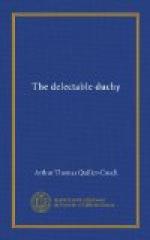“I wish a’most that I’d never called, if it puts you out so terrible,” was the wanderer’s plaintive remark after two minutes of silent waiting.
This sentence settled it. The temptation was irresistible. Geake unlocked the skivet, plunged a hand in and banged down a fistful of notes on the table.
“Here,” said he; “here’s five-an’-twenty pound’. You shall have it all if you’ll go straight out o’ this door an’ back to America.”
IV.
Half-an-hour later, William Geake was standing by his garden-gate again. Every now and then he glanced down the road towards St. Austell, and after each glance resumed his nervous picking at the blister of green paint that had troubled him earlier in the day. He was face to face with a new and smaller, but sufficiently vexing, difficulty. Abe Bricknell had gone, taking with him the five five-pound notes. So far so good, and cheap at the price. But the skivet was empty: and the day was Saturday: and every Saturday evening, as regularly as he wound up the big eight-day clock in the kitchen, Naomi and he would sit down and count over the money. True he had only to go to St. Austell and Messrs. Climo and Hodges would let him draw five new notes. The numbers would be different, and Naomi (prudent woman) always took note of the numbers: but some explanation might be invented. The problem was: How to get to St. Austell and back before Naomi’s return? The distance was too great to be walked in the time; and besides, the coffin must be ready by nightfall. He had promised it; he was known




